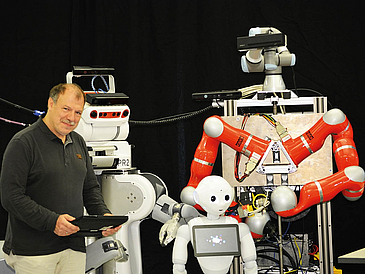The news hasn’t quite been absorbed yet: In September, IBM, Amazon, Google, Facebook and Microsoft, five of the world’s most powerful IT corporations, formed a consortium to promote research in the field of Artificial Intelligence (AI). In their own words, they want “to take a significant step forwards” and boost research on the ethical and societal consequences of AI technologies. The consortium bearing the name “Partnership in AI for the Well-being of Peoples and Society” has been set up find solutions by means of AI technologies to the serious issues facing today’s society.
Already last year, the Japanese telecoms giant Softbank added technology on humanoid robots to its portfolio by acquiring the French corporation Aldebaran. Then, this summer, the British chip designer ARM was bought for 29 billion euros to gain access to the Internet of Things. Moreover, just a few days ago, together with Saudi-Arabia the Japanese firm invested 100 billion euros to create the world’s largest technology fund.
What are the economic and societal implications of this cooperation between IT giants in the USA and the Japanese-Saudi joint venture with such high investment in AI and robotics for us here in Europe? And what are the repercussions for Bremen, which is an important center of AI and robotics research?
The combination of AI and robotics is a trend-setter that affects us all
Following the crucial initial stages of research and development, robotics and AI are currently experiencing something like a gold-digger syndrome, especially on the part of commercial enterprises. Autonomous vehicles, robots that work alongside humans, analysis of huge amounts of customer data, to name just a few examples, hold the promise of a veritable boom in innovative products and services. Markets have emerged with double-digit annual growth figures and investors are frantically seeking start-ups with interesting ideas. The volume of venture capital for robotics and AI in the USA and Asia is ten times as high as that available in Germany; and universities in those countries often work exclusively for enterprises with the highest growth expectations.
Bremen University Talks has put this red-hot development on its agenda with the topic “Cognition-enabled Robotics: Democratizing a Disruptive Technology”. On November 11, 2016, a panel of eminent experts comprising 40 representatives of international science and economy will debate our chances of success in face of such apparently overwhelming competition. How can our researchers and small and medium-sized enterprises as well as research and innovation policy successfully hold their own in a field of technology dominated by mega investors? There can be no doubt that the combination of artificial intelligence and robotics will be a trend-setter for societal development. However, although intelligent robots are impacting dramatically on international labor markets, many questions surrounding the future of work and the subsequent societal ramifications – as well as ultimately the issue of distribution of returns from “robot work” – remain completely unresolved and the subject of heated debate.
Calls for an open system for AI-based robotics
Professor Michael Beetz, who is coordinating the conference on November 11 together with Professor Andreas Birk, sees the most promising answer to the questions thrown up by such a concentration of research in the hands of just a few IT giants in the creation of a “community of interests”. Such a community of researchers and enterprises would develop open standards along the lines of open-source software: The idea would be to create flexible procedures to allow as big a pool as possible of different applications and place them at the disposal of the whole community. Whether robotics in agriculture or under water in the offshore industry, whether in the manufacturing industry or care services – “what we need is a ‘Linux’ for AI-based robotics”, says the renowned University of Bremen Professor. In a similar way that the Linux operating system of freely accessible programs realized by voluntary software developers triumphed against commercial operating systems, the task now is to develop an “open system for AI-based robotics”.
The coordinators, Michael Beetz und Andreas Birk, hope the Bremen University Talks 2016 will pave the way to develop common strategies and support the initiative for an accordant network. The aim is to organize the development of AI and robotics as a community effort for the benefit of as many people as possible and keep access to information open.
Background:
This year, the Bremen University Talks are being held for the 29th time. The Talks are financed by the Wolfgang-Ritter Foundation and coordinated by Prof.Dr. Michael Beetz (University of Bremen) and Prof.Dr. Andreas Birk (Jacobs University Bremen). You will find the program here.
The welcoming address will be held by Prof.Dr. Helge Bernd von Ahsen, Member of the Board of Trustees of the Wolfgang-Ritter Foundation, and Prof.Dr. Eva Quante-Brandt, Bremen’s Senator for Science, Health, and Consumer Protection.
The event opens in the Stadtwaage Bremen on November 10, 2016, at 6:00 p.m. with a talk titled “The Grammar of Action and Thought” by Prof.Dr. Yiannis Aloimonos, Institute for Advanced Computer Studies, University of Maryland (USA). Attendance at the conference to be held on November 11, 2016, is by invitation only.
If you would like to have more information, feel free to contact:
University of Bremen
Dr. Christina Jung
Phone: +49 421-218-60336
email: christina.jung@vw.uni-bremen.de

